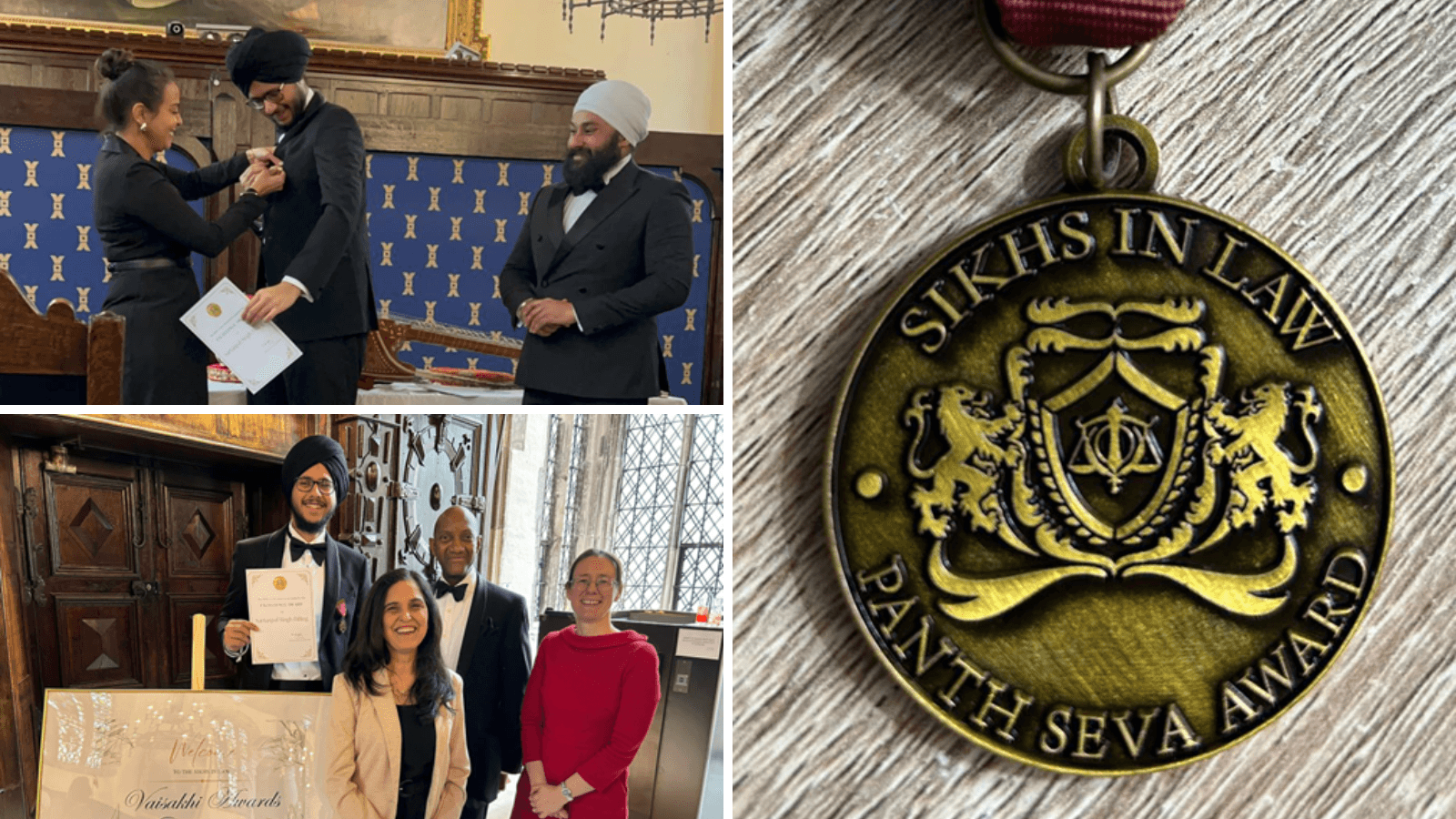- news
Wednesday, 12th June 2024
Law Centre caseworker picks up Sikhs in Law award

Ealing Law Centre immigration caseworker, Sartaz Billing, recently received a Legal Excellence Award from the Sikhs in Law Association.
The awards ceremony was held at the Old Hall in Lincoln’s Inn on Saturday, 24th April. It was attended by leading luminaries from the Sikh Community, members of the UK legal profession and a delegation of members of the USA Bar. The awards were presented by US Judge, Manpreet Singh.
Sartaz has been recognised for his work empowering marginalised communities across different roles over the last three years. He has helped to alleviate rough sleeping, and his interventions have lifted clients from poverty. He has supported tenants to avoid eviction by applying for Discretionary Housing Payments to settle rent arrears, and has secured Attendance Allowance for disabled pensioners so they have the necessary funds to sustain themselves. Today, he supports in the provision of specialist immigration advice to asylum seekers, potential victims of human trafficking, visa overstayers, late-EUSS applicants, and Windrush survivors.
Sartaz recently spoke to us about his journey to the Law Centre, his achievements, and his hopes for the future.
How did you come to work at Ealing Law Centre?
“Whilst at university, I wanted to do something with a public benefit. I first began working with homeless people as a volunteer for Herts Young Homeless. Following university, I had a brief stint at a solicitors’ firm, but it wasn’t for me, so I joined a branch of St Mungo’s, the national homelessness charity, in Ealing. In this role, I observed unmet legal need amongst rough sleepers that was contributing to their homelessness. I wanted to help meet this need.
“I took my first steps in that direction when I took up a triage and outreach role at Ealing Law Centre in January 2021. Eventually, I handled enquiries for the Law Centre’s rough sleeping project. There was quite a natural progression to becoming an immigration caseworker, because homelessness is often bound up with immigration problems. It also helps that I speak Punjabi, because the cohort I was working with included a lot of Punjabi-speaking individuals.
"My role as an immigration caseworker is very people-oriented, which I enjoy. I meet with clients, talk to them over the phone, explain how the law applies to them, and help them show how they meet the relevant Home Office criteria. I also enjoy the varied nature of the work and how I’m constantly challenging myself through legal research."
“I want to become a barrister, and I’m studying the Bar Course part time.”
Are there any cases you are particularly proud of?
“There are two that are published on the Ealing Law Centre website. One was an EU Settlement Scheme (EUSS) case where the client had lost his job and became homeless because he missed the deadline to apply to the EUSS. The client was referred to us by my old employer, St Mungo’s, and we were able to secure Settled Status for him.
“In another case, a blind single mother and her daughter faced destitution because the Home Office attached a No Recourse to Public Funds (NRPF) condition to the mother’s immigration status. It meant she would lose access to Universal Credit and Personal Independence Payment. We got the NRPF condition removed. Now, the client and her daughter are back to a position of safety.”
What is your opinion on the UK immigration debate?
“Immigration is one of the most polarising topics in UK politics. I really think it’s time we take a step back. Political rhetoric has made it quite easy to lose focus; immigrants are thought of in terms of numbers; immigration is seen as something to deal with, rather than something to take advantage of. We need to make immigration a boon for the country.
“Giving asylum seekers the right to work while their claims are being decided would improve their quality of life, reduce their reliance on the state, and reduce workforce shortages.
“Currently, migrants live in fear. We’ve had clients with valid asylum claims calling the Law Centre and asking whether they will be deported to Rwanda. Above all, if we look at people from a more humanitarian lens, this will be reflected in policymaking.”
The Law Centres Network is part of two campaigns rooted in our experience that seek to improve the lives of refugees and asylum seekers in the UK. The Families Together coalition campaigns for better family reunion rules. Currently, child refugees have no right to sponsor their immediate family members to join them.
Many asylum seekers can spend years nearly destitute, surviving only on inadequate Asylum Support payments. Lift the Ban is a coalition calling on the government to give asylum seekers the right to work during their asylum claim. The UK can and should do more to support people fleeing war and persecution. We call on the next government to establish safe and legal routes to the UK and spare asylum seekers needless social exclusion.
For media enquiries, please contact media@lawcentres.org.uk.
Latest News
Monday, 1st December 2025
Law Centre housing lawyer celebrated for "energy, empathy and resolve"Friday, 21st November 2025
Navigating Uncertainty: our latest annual review is outMonday, 10th November 2025
Remembering Sir Geoffrey Bindman
Stay in the loop
Sign up for our monthly newsletter to stay in the loop